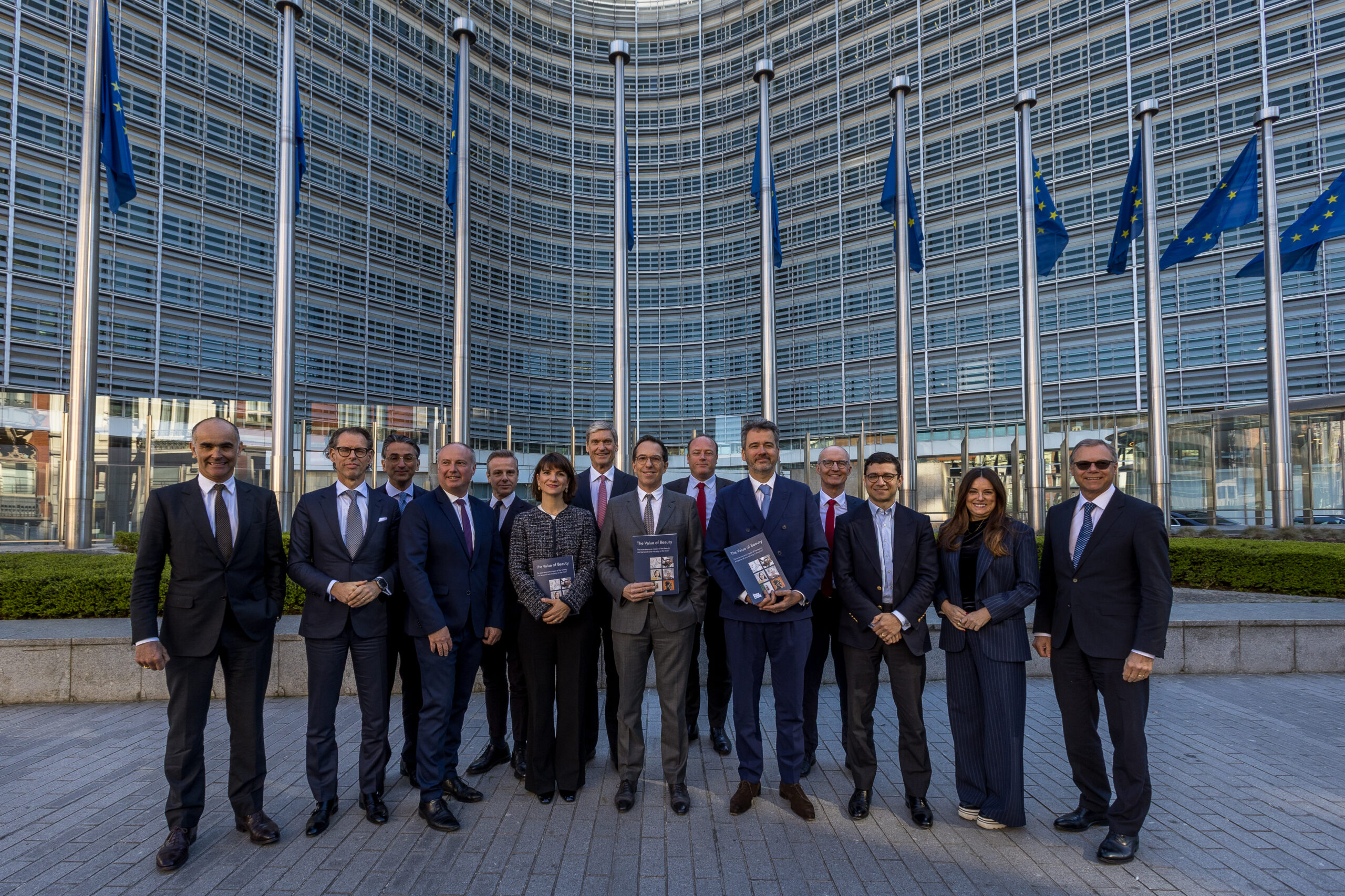
The Value of Beauty Report
What is the socio-economic impact of the beauty and personal care industry in the EU27?
Download The Value of Beauty Report here
Call for Action
We call on EU institutions to establish a regular dialogue with the beauty and personal care value chain to discuss the impact of EU policies and legislation on their competitiveness. The beauty and personal care value chain adds €180 billion to the EU27 GDP, equivalent to €496 million generated every single day, supporting almost 3.2 million jobs.In the EU27, the beauty and personal care industry spends over €2 billion a year on R&D. SMEs form the backbone of the European beauty and personal care value chain, these are typically family-owned companies with deep expertise, creating vital employment also in less-industrialised areas. EU beauty and personal care manufacturing companies exported €26 billion worth of goods to customers outside of the EU. This makes the EU27 the largest beauty and personal care exporter worldwide.
Download our Call for Action here
Our Policy Priorities
Our Policy Priorities highlights the importance of key areas such as the Single Market, trade policy, innovation, job creation, SMEs, sustainability, and social wellbeing. In each section, we call for strong collaboration with policymakers to create a regulatory environment that supports the competitiveness and growth of our industry.
Download our Policy Priorities here
Press Release
European Beauty & Personal Care CEOs Call for Strategic Dialogue With EU Institutions
Brussels, 18th March 2025 – CEOs from the Value of Beauty Alliance came together in Brussels today, to continue a constructive dialogue with EU institutions about the impact of EU policies and regulations on the industry’s global competitiveness and sustainability goals. The CEOs underscored the industry’s long-held commitment to a sustainable future and called for collaborative policymaking that recognizes the industry’s unique characteristics, challenges, and significant contributions to the EU economy.
The Alliance also unveiled a groundbreaking new report conducted by Oxford Economics, which outlined the significant socio-economic impact of the Beauty & Personal Care value chain. The beauty and personal care value chain adds €180 billion to the EU’s GDP, equivalent to €496 million generated every single day and supports almost 3.2 million jobs. EU beauty and personal care manufacturing companies also exported €26 billion worth of goods to customers outside of the EU. making the EU27 the largest beauty and personal care exporter worldwide. The EU beauty and personal industry continues to grow and lead in global competition, with 5 of the 7 largest beauty companies headquartered in the EU, but this lead is not a given.
The CEOs called on EU Institutions to engage in a constructive dialogue to discuss the impact of EU policies and legislation, in order to ensure that the Beauty & Personal care value chain can maintain its leading position on the global stage.
For example, the Alliance calls on the EU to urgently review recently adopted legislation on the treatment of urban wastewater to ensure that all sectors contributing to micro-pollutants in water are held responsible, in line with the polluter pays principle. This will not only drive the development of more sustainable products across all industry sectors but also ensure that this does not place a disproportionate cost burden on one of Europe’s few globally leading sectors. The Alliance believes that the upcoming Omnibus process presents an ideal opportunity to redress this imbalance and foster a level playing field for all industries contributing to water pollution.
Looking ahead, the CEOs also urged the EU to prioritize the following key areas:
- REACH Regulation and Cosmetic Product Regulation Revisions: Focus on consumer safety and environmental protection based on robust risk assessment and real-world ingredient use, maintaining high scientific standards.
- Trade Agreements: Prioritize market access, reduce regulatory barriers, and support the export of high-quality European products. Strengthen customs checks and rigorously enforce environmental and sustainability requirements for imported products, both online and offline, to ensure a level playing field.
- Bioeconomy Transition: Implement policies that support sustainable ingredient manufacturing, address the “green premium” for sustainable technologies, and secure a reliable long-term supply of sustainable feedstock.
- Workforce Development: Partner with the industry to develop targeted training programs and investment instruments for upskilling the workforce and meeting the evolving needs of the sector.
The Value of Beauty Alliance remains committed to working closely with EU institutions to develop policies that foster innovation, create jobs, and secure the continued global competitiveness of the European beauty and personal care industry. This collaborative approach will be essential for ensuring the industry’s continued contribution to the European economy and a sustainable future.
***
Oxford Economics study highlights:
The Value of Beauty Alliance commissioned Oxford Economics to conduct a study which evaluated the economic impact of the value chain across the EU examining its contribution to GDP, employment figures, R&D spend and consumer household spending.
Economic impact of beauty and personal care sector
- Consumer spending in the EU exceeded €180 billion in 2023.
- Daily consumer spending on beauty and personal care is nearly €500 million.
- The sector contributed to €71 billion in tax receipts in 2023.
- Direct contribution to GDP (€78 billion) surpasses several manufacturing sectors, including beverages, textiles, and air transport.
- The sector overall employs nearly 3.2 million people across Europe—greater than the total number of workers in 13 EU Member States, such as Denmark and Finland
Research and innovation in the sector
- Beauty and personal care R&D expenditure exceeded €2 billion in 2021, with a 30% growth from 2013-2021.
- The sector has a higher frequency of R&D job postings compared to the EU average (2.4% vs 0.7%).
- A significant portion of R&D roles in the sector focuses on STEM, particularly in chemical and laboratory positions.
- Innovation is a key skill required in 31% of R&D job postings.
Social impact
- Through their day-to-day operations, beauty and personal care companies are promoting inclusive employment and working with suppliers to implement socially responsible hiring practices. This includes initiatives supporting vulnerable women, young people not in employment or training, and communities in deprived areas across the EU.
- The support provided by beauty and personal care companies to social causes also extends beyond its own value chain. Examples include inclusive sourcing, programs committed to fighting stigmatisation and social exclusion caused by skin diseases and creating specific product lines to support women during menopause.
Environmental sustainability efforts
- The sector is addressing environmental challenges through various sustainability initiatives. Some key examples of work happening across the value chain include:
- Reformulating products to minimise their environmental impact at all stages of their lifecycle.
- Introducing innovations in packaging to reduce the use of plastic, increase recyclability, increase the use of recycled materials and optimise the amount and weight of material used.
- Transitioning away from the use of fossil fuels towards renewables through clean tech and low carbon technologies.
- Reducing the direct environmental impact of operations, for example by using innovative technology to identify sources of heat losses in manufacturing plants; and
- Improving collaboration and transparency across the supply chain to proactively reduce its indirect environmental footprint.
The full report is available to download here
***
About the Value of Beauty alliance
The CEO-led Value of Beauty Alliance brings together the European beauty and personal care value chain through its 16 members, from farmers to glassmakers, and fragrance houses to cosmetic multinationals – Albéa Group, Ancorotti Cosmetics, Beiersdorf, Capua 1880, Cosmetic Valley, dsm-firmenich, FIABILA, Givaudan, IFF, IFRA, KIKO Milano, L’Oréal Groupe, PATYKA, Puig, Verescence, and Ziaja. Launched in January 2024, the Alliance was established to ensure that the entirety of the beauty value chain is taken into consideration by European policymakers and is recognised as a strategic sector of the EU society and economy.
Contact:
*** ENDS ***
Download our Press Releases Below
Value of Beauty Press Release ENGLISH
Value of Beauty Press Release FRENCH
Value of Beauty Press Release GERMAN
Value of Beauty Press Release ITALIAN
Value of Beauty Press Release POLISH
Value of Beauty Press Release SPANISH
Download The Value of Beauty CEO Quotes Below







